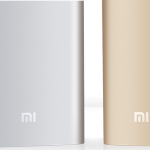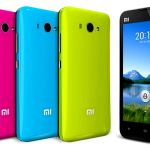Xiaomi goes after GoPro with Mi Pro Action Camera

Xiaomi may be best known for its smartphones, but the company is exploring other markets as well. On top of its Android phones, its lineup also includes a tablet, activity tracker, TV, router, external batteries, headphones and much more. One might say that Xiaomi is looking to sell a lifestyle, not just gadgets.
Today, Xiaomi is entering another market with the announcement of Mi Pro Action Camera. The company's first action camera offers exactly what you might expect out of a Xiaomi device: decent hardware and great value. It's not up there with the best that GoPro has to offer, but it's also not as expensive.
After disrupting the smartphone market in China, Xiaomi announces plan to enter the US this year

After growing its user base in China, and expanding presence in Singapore, Taiwan, India, and four other international regions, Chinese smartphone manufacturer Xiaomi is taking its first step to debut in the United States market. Hugo Barra, Xiaomi’s VP of International announces the company’s plan to sell a range of products to United States residents through its website Mi.com "in a few months".
The company, however, doesn't plan to sell its dirt-cheap smartphones in United States just yet. Instead, Barra says that Xiaomi will be selling products such as health bands, power chargers, and headphones. Xiaomi "can bring these products to market much faster because they are simpler to take to market", he said at a news conference in San Francisco.
Xiaomi: Hand over your iPhone, get a Mi Note flagship for free

Xiaomi is going hard against Apple in 2015. CEO Lei Jun recently gave several shoutouts to the Apple's inferior design quality on the iPhone 6 when compared to the Mi Note.
And now the next step in the battle will focus on swapping iPhones for Xiaomi Mi Note and Mi Note Pro at no extra cost, according to a new report citing Xiaomi's media development director.
Xiaomi brings its Mi 4 flagship smartphone to India

Half a year after it unveiled Mi 4, Chinese smartphone vendor Xiaomi is bringing its "fastest & most gorgeous Mi Phone ever" to India. Starting February 10, local consumers will be able to get their hands on the flagship device through retailer Flipkart.
Mi 4 is one of the most interesting smartphones unveiled in 2014, in no small part thanks to its $320 starting price. Handsets from rival makers such as Samsung have price-tags twice as high, so it is easy to understand what makes it such an appealing option in the flagship segment. Fortunately for those wanting to get their hands on Mi 4 in India, its price-tag is still as attractive as ever.
Xiaomi reveals its iPhone 6 Plus competitors

Chinese maker Xiaomi is going after iPhone 6 Plus with two new premium phablets unveiled today at a special event in Beijing. Called Mi Note and Mi Note Pro, the two Android handsets feature high-end hardware and, in typical Xiaomi fashion, lower price-tags than their Apple-made rival.
Xiaomi is calling both devices a flagship, although, judging by the specs alone, Mi Note Pro is clearly more deserving of the title, as it features the latest-available technologies. It is also better equipped to take on iPhone 6 Plus, which has proven to be quite successful for a phablet.
Xiaomi infringes Ericsson patents in India, local court bans sales until February 2015

Xiaomi has enjoyed great success in its home market of China, becoming the largest vendor in the country in Q2 2014, beating Samsung for the title. The company also was the third-largest smartphone maker worldwide in Q3 2014. And things appear to only be looking up for Xiaomi, with shipments expected to grow at a still rapid pace.
One of the reasons why Xiaomi has managed to reach the top spot in its home country is the permissive local legal system, in relation to patents. The company hasn't really been challenged locally by any of the big non-Chinese players, as quite likely any suits filed against it for patent infringement would be lost by the plaintiffs. Western companies have been dealing with this problem for (too) many years. However, as Xiaomi expands into India, it has to deal with a different legal system, one which just sided with Ericsson in a case of patent infringement. The outcome?
Xiaomi is the third-largest smartphone maker

For a manufacturer that has only been selling smartphones for a couple of years now, Xiaomi is doing better than expected. The Chinese company, founded in 2012, became the third-largest smartphone vendor in Q3 2013, surpassing the likes of Lenovo, LG and Huawei. Xiaomi is also closing in fast on Apple, which has enjoyed a comfortable lead, in volumes, over its immediate competition.
Xiaomi's shipments have increased by 211.3 percent year-over-year, to 17.3 million units in the past quarter from just 5.6 million units in Q3 2013. That is more than eight times higher than the market average, of 25.2 percent. Meanwhile, Apple's shipments only grew by a mere 16.1 percent, which is well below the market average, to 39.3 million units from 33.8 million units.
Xiaomi price drop suggests new flagship devices are on their way

Chinese smartphone manufacturer Xiaomi looks set to implement a price reduction drive across a number of its devices, increasing speculation that new flagship models will be released in the not-too-distant future.
According to a report by GizChina, citing Xiaomi's e-commerce webpage Tmall, several of the firm's products, including its Mi 4 smartphone and Mi Pad tablet have received new price tags.
Taiwan could ban Xiaomi smartphones over data security concerns

Xiaomi has found itself under scrutiny due to concerns that it may be a security threat, with the Taiwanese government expected to make a decision on the smartphone company within three months. It is unclear whether this could lead to a ban on Xiaomi's low-priced smartphones in Taiwan.
A statement on the website of Taiwan's executive branch on Tuesday referred to the fact that some of the company's smartphones automatically send user data back to the Xiaomi servers in Beijing, resulting in a risk of security breaches.
Xiaomi Redmi 1S is the 4th best-selling smartphone -- in the world!

Apple might be hoping to make big inroads in China with the iPhone 6 and 6 Plus, but it has some stiff opposition standing in its way.
Xiaomi is a Chinese smartphone maker known for producing powerful yet affordable handsets. While its name might mean little to you, Xiaomi is now the world’s fifth largest smartphone vendor and the company’s devices are so popular in China that they account for 14 percent of the smartphone shipments in that country, easily beating the likes of Samsung, Lenovo, and Huawei. One of its handsets, the Xiaomi Redmi 1S, is so successful it now ranks as the world's 4th best-selling smartphone.
Cheap handsets in India and China fuel huge global surge in smartphone shipments

New figures show that global smartphone shipments for 2014 are set to be 19 percent higher than the previous year. Juniper Research reports that handset shipments are forecast to jump from 985 million in 2013 to 1.2 billion this year.
Smartphone popularity continues to rise, and this has been driven -- at least in part -- by the appearance of handsets with bargain basement prices. While the likes of Apple push premium-priced smartphones, emerging markets are lapping up handsets priced at $150 and under.
Xiaomi's MIUI 6 beta is here and the Android ROM shames Google's stock experience

As a Linux user and lover, I prefer Android smartphones to iOS. While I love the freedom and functionality of Google's mobile operating system, there is one thing I hate -- the UI. That is a pretty big deal and usually a deal-breaker for a consumer. However, I put up with the dreary UI and clunky app drawer because I can customize it with different launchers, wallpapers and icon packs. While this is passable, I long for a redesign to mimic something similar to iOS 7. I crave beauty and art, but alas, Google seems disinterested in doing anything radical -- Android L "Material Design" seems too safe and boring.
The design savior for many years has been the Chinese-born ROM, MIUI; however, as more and more devices ship with impossibly hard-to-hack locked bootloaders, the gorgeous ROM has not been ported to as many devices; even unofficially. And so, users have been limited to MIUI-styled launchers, but not the full experience. Excitingly, MIUI 6 is now released in beta form, but sadly, most Android users will not be able to flash the beta, or the final version for that matter. This locked bootloader nonsense is a tragedy, as MIUI 6 is sexy as hell and puts Google's vision of Android to shame.
Xiaomi leads the smartphone market in China

Xiaomi's name may mean close to nothing in western markets, but the smartphone maker is well-known in Asia for its powerful yet affordable handsets. Take the new Mi 4 flagship, for instance. It rivals HTC's One (M8) in the specs department, but can be had for less than what Google asks for its Nexus 5. There's a similar story with other Xiaomi-made devices, that are proving to be extremely popular with consumers in China.
Xiaomi's smartphones are so popular in China that, in the second quarter of the year, they allowed the manufacturer to overtake worldwide leader Samsung in the local Asian market, according to a new report from analyst firm Canalys. Xiaomi, which is a Chinese vendor, was responsible for 14 percent of smartphone shipments in the country, surpassing Samsung, Lenovo, Yulong and Huawei. The combined market share of top worldwide vendors Samsung and Apple was just 18 percent in China in Q2 2014, as the two were able to ship just 20 million units put together.
Smartphone market sees stiffer competition

The competition is heating up in the smartphone space, as, in Q3 2014, a dozen vendors have what it takes to shake up the top five smartphone makers list, according to a new report from research firm IDC. Judging by the standing from Q2 2014, the likely players in danger of losing their spots are Huawei, Lenovo and LG.
Samsung and Apple continue to be in a position of strength, with the two being responsible for 25.2 percent (74.3 million) and 11.9 percent (35.1 million), respectively, of the 295.3 million smartphones shipped in the quarter that ended June 30. That said, both lost market share compared to Q2 2013, when they claimed 32.3 percent and 13 percent, respectively, thanks to shipments of 77.3 million and 31.2 million units, respectively.
Xiaomi announces Mi 4 flagship smartphone

Chinese maker Xiaomi has unveiled its new flagship Android smartphone. Dubbed Mi 4, it is described by the company's Global VP Hugo Barra as the "fastest & most gorgeous Mi Phone ever".
Mi 4 comes with hardware specifications that are typical of an Android flagship announced in 2014. It packs a 5-inch IPS display with a resolution of 1080 by 1920, and is powered by a quad-core Qualcomm Snapdragon 801 processor. Pretty standard stuff, except for the price.
Recent Headlines
Most Commented Stories
BetaNews, your source for breaking tech news, reviews, and in-depth reporting since 1998.
© 1998-2025 BetaNews, Inc. All Rights Reserved. About Us - Privacy Policy - Cookie Policy - Sitemap.